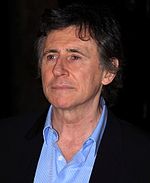
Gabriel Byrne
Irish actor
Swiss Protestant theologian (1886-1968)
Karl Barthwas a Swiss Reformed theologian. Barth is best known for his commentary The Epistle to the Romans, his involvement in the Confessing Church, including his authorshipof the Barmen Declaration, and especially his unfinished multi-volume theological summa the Church Dogmatics (published between 1932-1967).
Table of Contents
Karl Barthwas a Swiss Reformed theologian. Barth is best known for his commentary The Epistle to the Romans, his involvement in the Confessing Church, including his authorshipof the Barmen Declaration, and especially his unfinished multi-volume theological summa the Church Dogmatics (published between 1932-1967). Barth’s influence expanded well beyond the academic realm to mainstream culture, leading him to be featured on the cover of Time on 20 April 1962.
Like many Protestant theologians of his generation, Barth was educated in a liberal theology influenced by Adolf von Harnack, Friedrich Schleiermacher and others. His pastoral career began in the rural Swiss town of Safenwil, where he was known as the “Red Pastor from Safenwil”. There he became increasingly disillusioned with the liberal Christianity in which he had been trained. This led him to write the first edition of his The Epistle to the Romans (a.k.a. Romans I), published in 1919, in which he resolved to read the New Testament differently.
Barth began to gain substantial worldwide acclaim with the publication in 1921 of the second edition of his commentary, The Epistle to the Romans, in which he openly broke from liberal theology.
He influenced many significant theologians such as Dietrich Bonhoeffer who supported the Confessing Church, and Jurgen Moltmann, Helmut Gollwitzer, James H. Cone, Wolfhart Pannenberg, Rudolf Bultmann, Thomas F. Torrance, Hans Kung, and also Reinhold Niebuhr, Jacques Ellul, and novelists such as Flannery O’Connor, John Updike, and Miklos Szentkuthy.
Among many other areas, Barth has also had a profound influence on modern Christian ethics, influencing the work of ethicists such as Stanley Hauerwas, John Howard Yoder, Jacques Ellul and Oliver O’Donovan.
Conscience is the perfect interpreter of life.
Swiss Protestant theologian (1886-1968)
Man can certainly flee from God… but he cannot escape him. He can certainly hate God and be hateful to God, but he cannot change into its opposite the eternal love of God which triumphs even in his hate.
Swiss Protestant theologian (1886-1968)
Faith is never identical with piety.
Swiss Protestant theologian (1886-1968)
Joy is the simplest form of gratitude.
Swiss Protestant theologian (1886-1968)
It is always the case that when the Christian looks back, he is looking at the forgiveness of sins.
Swiss Protestant theologian (1886-1968)
In the Church of Jesus Christ there can and should be no non-theologians.
Swiss Protestant theologian (1886-1968)
The best theology would need no advocates; it would prove itself.
Swiss Protestant theologian (1886-1968)
Whether the angels play only Bach praising God, I am not quite sure. I am sure, however, that en famille they play Mozart.
Swiss Protestant theologian (1886-1968)
Jesus does not give recipes that show the way to God as other teachers of religion do. He is himself the way.
Swiss Protestant theologian (1886-1968)
Laughter is the closest thing to the grace of God.
Swiss Protestant theologian (1886-1968)
No one can be saved – in virtue of what he can do. Everyone can be saved – in virtue of what God can do.
Swiss Protestant theologian (1886-1968)
Grace must find expression in life, otherwise it is not grace.
Swiss Protestant theologian (1886-1968)
It may be that when the angels go about their task praising God, they play only Bach. I am sure, however, that when they are together en famille they play Mozart.
Swiss Protestant theologian (1886-1968)
What God chooses for us children of men is always the best.
Swiss Protestant theologian (1886-1968)
Men have never been good, they are not good and they never will be good.
Swiss Protestant theologian (1886-1968)
Faith in God’s revelation has nothing to do with an ideology which glorifies the status quo.
Swiss Protestant theologian (1886-1968)
Jews have God’s promise and if we Christians have it, too, then it is only as those chosen with them, as guests in their house, that we are new wood grafted onto their tree.
Swiss Protestant theologian (1886-1968)
Religion is the possibility of the removal of every ground of confidence except confidence in God alone.
Swiss Protestant theologian (1886-1968)